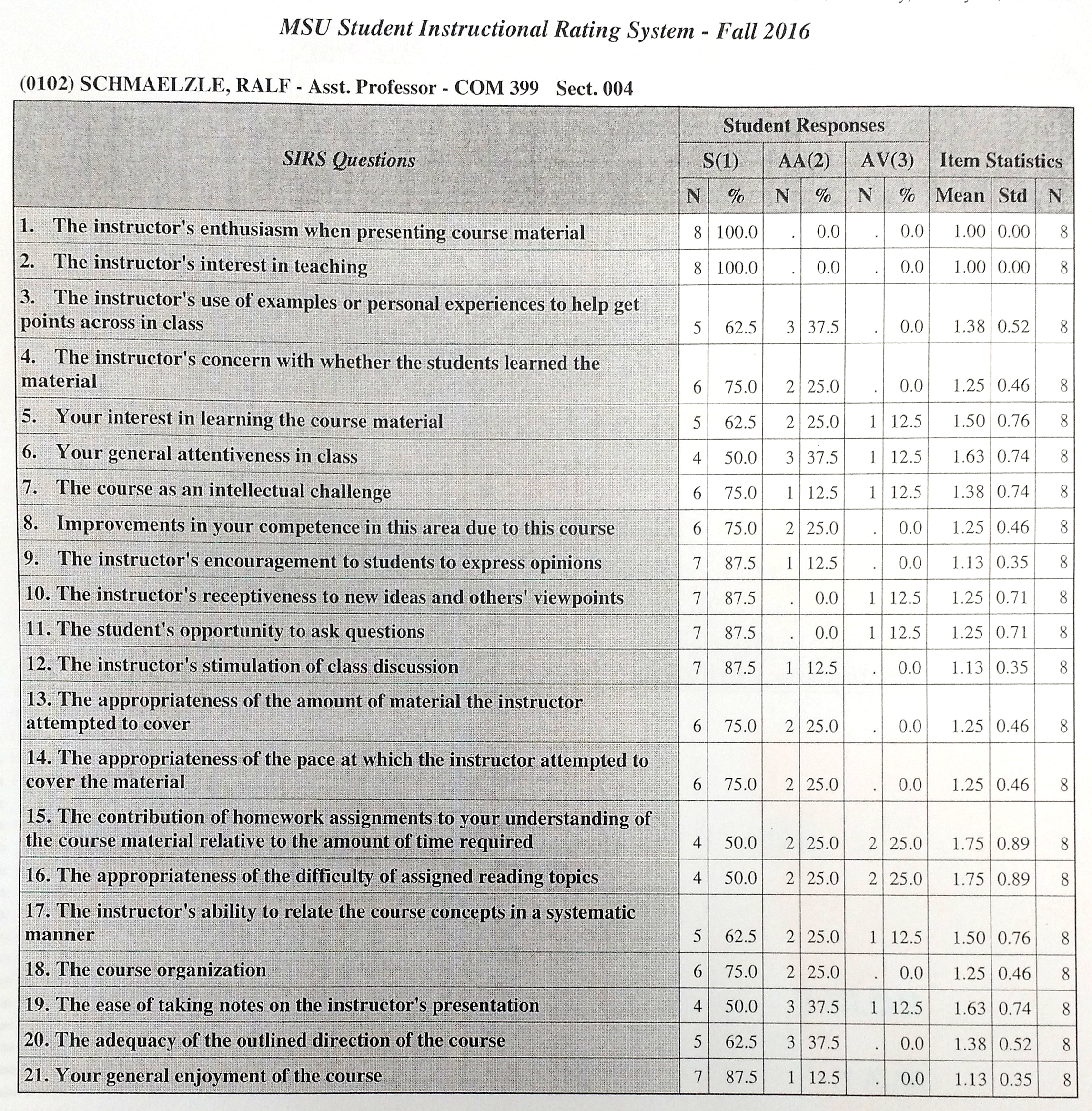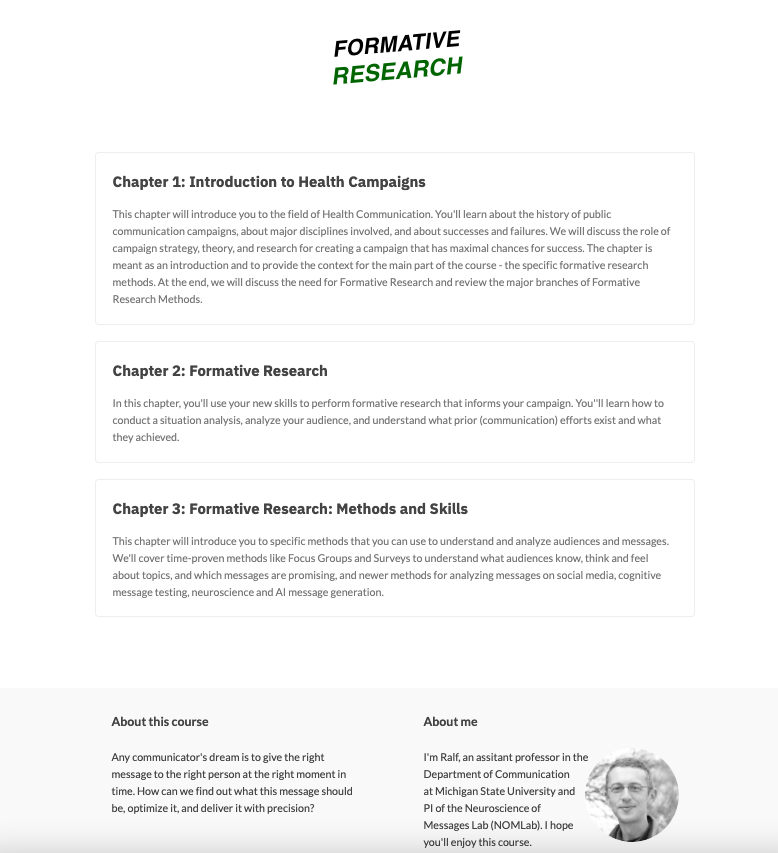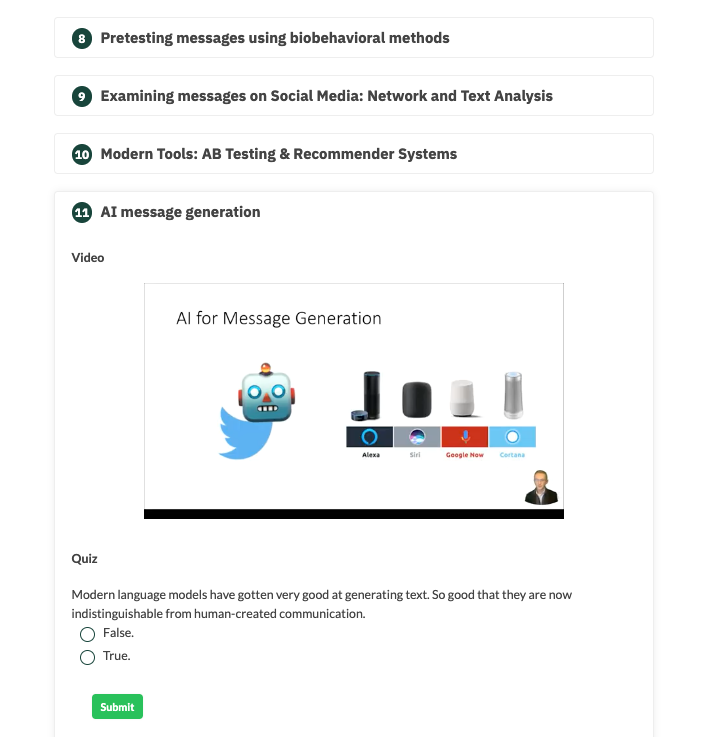Teaching is an essential part of my academic career. I am very passionate about research and thus consider it as a privilege to be able to teach courses on my subjects of interest.
I believe that a good teacher is one who manages to create enthusiasm for his subject and is able to convey both information and a broader set of universally applicable skills. In practice, this requires a good mix of delivering factual knowledge, teaching practical skills, and fostering self-directed learning and thinking.
In the past, I have taught a broad variety of courses that ranged from introductory lectures to advanced seminars. Since I began teaching in 2001 (then as a student instructor), I enjoyed working with generations of students and have advised a multitude of theses. I am extremely indebted to each student because this teaching has really been a two-way street.
| 2025 | Public Communication Campaigns | Seminar |
| 2025 | Digital Health Communication Interventions | Seminar |
| 2025 | Public Communication Campaigns | Seminar, hybrid |
| 2025 | Independent Studies | Independent Studies |
| 2024 | Various lectures, seminars, and Independent Studies | Lecture, hybrid |
| 2023 | Introduction to Cognitive Science | Lecture, hybrid |
| 2023 | Formative Research in Health Communication: From time-proven tools to neuroscience and AI | Seminar hybrid |
| 2023 | Neurocognitive Communication | Lecture, hybrid |
| 2023 | Formative Research in Health Communication: From time-proven tools to neuroscience and AI | Seminar hybrid |
| 2022 | Introduction to Cognitive Science | Lecture, hybrid |
| 2022 | Formative Research in Health Communication: From time-proven tools to neuroscience and AI | Seminar, hybrid |
| 2022 | Media Neuroscience | Seminar, in-person |
| 2022 | Public Communication Campaigns | Seminar, hybrid |
| 2021 | Public Communication Campaigns | Seminar, online, asynchronous |
| 2021 | Formative Research in Health Communication: From time-proven tools to neuroscience and AI | Seminar, online, asynchronous |
| 2021 | Independent Study | Independent Studies |
| 2020 | Mass Communication and Public Health | Seminar, online |
| 2020 | Formative Research in Health Communication: From time-proven tools to neuroscience and AI | Seminar, online |
| 2020 | Media Neuroscience | Seminar, online, hybrid |
| 2020 | Public Communication Campaigns | Seminar, online, hybrid |
| 2019 | Mass Communication and Public Health | Seminar |
| 2019 | Public Communication Campaigns | Seminar |
| 2019 | Communication Neuroscience | Seminar |
| 2019 | Think Tank: Communication as a Dynamic Process | Seminar |
| 2019 | Independent Study | Independent Studies |
| 2019 | Social Influence and Interpersonal Conflict | Seminar |
| 2018 | Public Communication Campaigns | Seminar |
| 2018 | 2 Independent Studies SS2018,FS2018 | Independent Studies |
| 2018 | Public Communication Campaigns | Seminar |
| 2018 | Neurocognitive Communication | Seminar |
| 2017 | 4 Independent Studies SS2017 | Independent Studies |
| 2017 | Public Communication Campaigns | Seminar |
| 2016 | Communication and the Brain | Seminar |
| 2014/2015 | Empirical Research Methods I | Lecture & Seminar |
| 2014 | Learning and Memory in the Real World | Seminar |
| 2014 | Research Colloqium Biopsychology | Colloqium |
| 2013/2014 | Empirical Research Methods I | Lecture & Seminar |
| 2013 | Learning and Memory in the Real World | Seminar |
| 2013 | Research Colloqium Biopsychology | Colloqium |
| 2012/2013 | Empirical Research Methods I | Lecture & Seminar |
| 2012 | Empirical Research Methods II | Seminar |
| 2012 | Research Colloqium Biopsychology | Colloqium |
| 2011/2012 | Empirical Research Methods I | Lecture & Seminar |
| 2011 | Empirical Research Methods II | Seminar |
| 2010/2011 | Empirical Research Methods I | Lecture & Seminar |
| 2010 | A Hitchhiker's Guide to the CNS | Seminar |
| 2009/2010 | Empirical Research Methods I | Lecture & Seminar |
| 2007 | Emotion, Stress, and Social Neuroscience | Seminar |
| 2006-2008 | Baden-Württemberg higher education teaching certificate | |
| 2001-2005 | >10 seminars as TA | |
In addition to teaching in classroom environments, I work together with graduate and undergraduate students. I am convinced that this hands-on traning is simply the best way of learning and thus should inspire one’s teaching approach. Furthermore, teaching discussions often let me understand things better or have new ideas myself. As such, advising enriches my own work and provides valuable input for research and teaching. I devote much effort to mentoring-related activities and am glad when others also ‘catch fire’ for research. Several advisees have won best-paper/poster awards and scholarships.
Here are some older, handwritten ![]() Quelle: Bildrechte beim Autor examples (older).
Quelle: Bildrechte beim Autor examples (older).
• course is very structured and presented in a very articulate fashion
• we learn a lot and the structure is clear
• everything is very structured and thus comprehensible
• prepared every day … cared about students & their success
• learned so much and enjoyed every minute
• competent and confident
• good explanations and discussions
• very good answers to all questions
• you do a wonderful job of introducing complicated material in a fun and fascinating way
• Dr. Schmälzle’s explanations
• Really taught me how to effectively do research, I am now interested in applying these theories
• very dedicated
• always with new ideas
• Professor Schmaelzle is extremely enthusiastic and is genuinly interested in teaching/making sure students understand the material
• vivid, interesting, good tempo
• refreshing and our attention is constantly won back
• conveys lots of enthusiasm
• so caring and passionate about teaching
• fun personality and very passionate
• finally, there is practical relevance
• topics from method and statistics course are applied
• interesting topics
• has sparked my interest in pursuing a field of research I would have otherwise never known about
• the combination of communication and neuroscience is what we needed not only in undergrad, but also in graduate level
• (… exams were fair and) our final presentations helped us take a look into a real-life appliance of the material
• good balance between seriousness and fun
• allowed me to learn from experinece and provide the space to question existing scholarship
• responsive to student’s needs
• constant use of examples to make things more clear
• great importance of visualization
• good atmosphere
• This course was very enjoyable, esp. as an 8 AM! I felt very comfortable asking questions …
• I thoroughly enjoyed this course. It was by far the most engaging course I have taken at [edited to preserve institution X’s reputation ;-)] • so much fun, made course enjoyable and helped getting through rough material!
• student involvement
• Presenters were also fun/interesting, esp. the neuroscience guy (comment on a guest lecture)
• truly cared if students were engaged
I strive to improve my knowledge base and instructional methodologies. I spent significant time and effort to improve my teaching skills by completing the Baden-Württemberg-Certificate for University Teaching (![]() Quelle: Bildrechte beim Autor my diploma). The following briefly identifies my efforts:
Quelle: Bildrechte beim Autor my diploma). The following briefly identifies my efforts:
• 2 Courses Basics of teaching in higher education’ 60 hrs
• In-class supervision and video analysis
• Writing pedagogical reflections
• Thesis supervision and academic writing skills
• Time-, project, and self-management in higher education
• Managing difficult teaching situations
• Engaging and activating teaching formats
• Team development and communication skills
• Writing reflections about the attended courses
• Practical supervision courses
• Special teaching project: Creating, testing, and teaching a new course ‘Emotion, Stress, and Social Neuroscience’, documenting the course and writing a final pedagogical reflection
• Visited several lectures by the local teaching skills agency
• Read many teaching-related books, such as ‘What the best college teachers do’ or books on teaching writing skills
• I am evaluating all courses and constantly strive to improve them , e.g. by implementing new experiments or changing assignments
• Internet (more to come!)
My colleague Alex Barth and I have been awarded the ‘2012 Master Docendi‘ student teaching award in psychology (see ![]() Quelle: Bildrechte beim Autor media report – in German). I am particularly happy about receiving this “students’ choice” award because no other attempt to measure teaching quality could better indicate performance in putting my teaching philosophy into practice. However, there is always room for improvement! For instance, I spent significant time and effort to complete the Baden-Württemberg-Certificate for University Teaching and to improve academic writing training. Another area is teaching coding and scientific reproducibility. You can see some efforts in this regard on my lab’s github account and in the Independent studies sections.
Quelle: Bildrechte beim Autor media report – in German). I am particularly happy about receiving this “students’ choice” award because no other attempt to measure teaching quality could better indicate performance in putting my teaching philosophy into practice. However, there is always room for improvement! For instance, I spent significant time and effort to complete the Baden-Württemberg-Certificate for University Teaching and to improve academic writing training. Another area is teaching coding and scientific reproducibility. You can see some efforts in this regard on my lab’s github account and in the Independent studies sections.
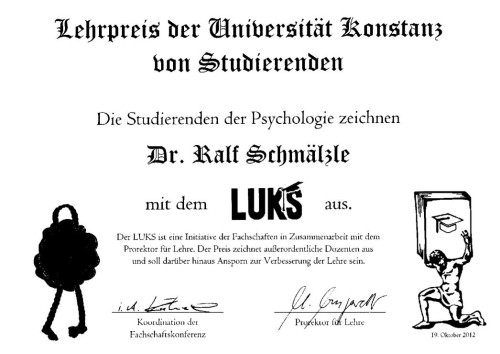
I use state-of-the art online tools to teach computational cognitive and communication neuroscience. A sample of it is here: Online Tutorial . Don’t get discouraged by the code – it is super easy to learn – and fun. Just click the ‘binder’-button and then go to the folder scripts. The rest will be explained.
Stay tuned … more is underway.

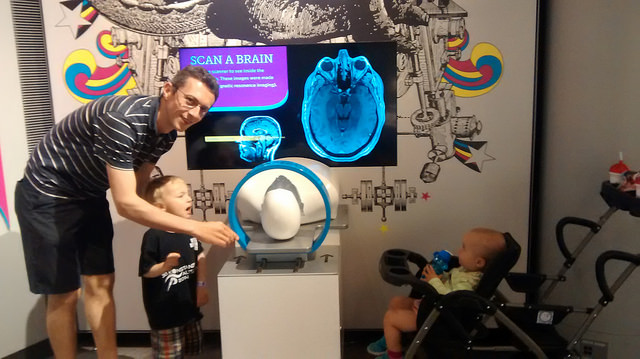
I am prepared to teach courses that range from health communication to neuroscience – and from pre-k to university-level courses.

I also explore the structure and development of folk psychological concepts and their implications for psychological science and neuroscience. Above, you can see example responses I received when I asked my kids (left: 54m, right: 72m) to show me how thinking works. The answers are rather narrowly focused on toy-related needs and desires, or conflicts between equally attractive brands, but the gist is there.
This quote (from Russ Poldrack) pretty much captures my goal: “There are few things as gratifying to me as a teacher as watching someone who thought they couldn’t code 1) learn to code, and 2) enjoy it.”
